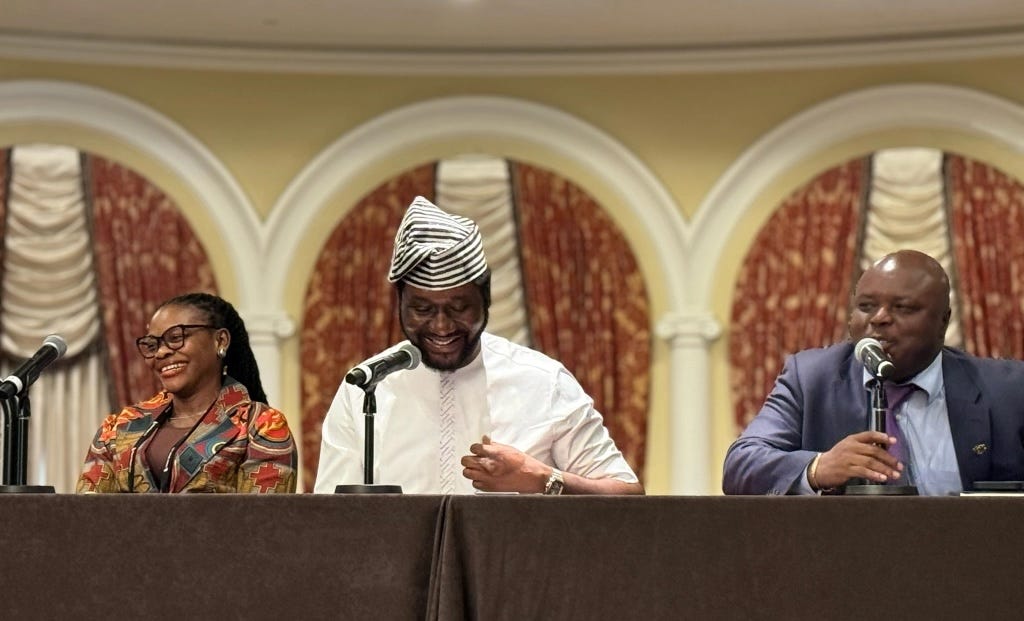FOR IMMEDIATE RELEASE

WASHINGTON, D.C. — With legislatures tasked with devising solutions to achieve their nations’ climate goals, Citizens’ Climate International initiated the first Interparliamentary Exchange earlier this month. The exchange provided a forum for lawmakers and others to share their experiences and learn from each other about how to infuse climate value into the policies and programs they’re working to enact in their countries.
During the Exchange, the costs and impacts of climate change and a just transition to renewable energy were leading topics brought up by the legislators. The Hon. Terseer Ugbor, a member of the Nigerian House of Representatives, said desertification in the northern part of the country is displacing herdsmen and causing violent clashes with farmers.
“[The desert is] still coming, and it’s led to a lot of problems where herdsmen can’t find water and can’t find vegetation for their animals anymore,” said Terseer. “This has led to migration of herdsmen toward the southern part of the country, and this migration means that the herdsmen encroach on farmland.”
On the subject of a just transition, Terseer said that phasing out fossil fuels will be difficult for Nigeria, a nation dependent on oil and gas extraction for a significant part of its economy. “We in Africa see the hypocrisy of the West, in a way, where the West was built on coal. Coal power. Gas Power. But now we’re being forced to rely strictly on renewables.”
“We need a lot more support. A lot more engagement and a fairer transition from fossil fuels to renewables,” said Terseer.
For the visiting lawmakers, one of the most inspiring aspects of the Interparliamentary Exchange was seeing how Citizens’ Climate Lobby volunteers engage members of Congress with an attitude of appreciation and finding common ground to push climate solutions forward.
“One of the key things I’m taking away from here is that climate action and advocacy depends a lot on relationships and the quality of those relationships,” said Chinwe Obuaku-Igwe, a government consultant in Nigeria. “It’s all about getting everyone to find common ground, to find that shared humanity that gives us that impetus that empowers us to save the planet, to save the Earth for our children.”
In a summary statement about the Exchange released last week, Citizens’ Climate International called for multilateral cooperation to infuse Climate Value into decisions about investments and trade:
“Climate Value is a critical missing ingredient in local, national, and global analysis of finance, investment, public policy, and trade priorities. The world cannot wait for one perfect metric; we must accept that Climate Value will look and feel different, according to local context and experience. It will also connect to nearly all areas of sustainable and integrated human development.”
In July of 2025, CCI will build on the 2024 Interparliamentary Exchange by organizing a Climate Value Exchange Conference that will welcome lawmakers, other officials, and stakeholders from at least 10 countries.
“Ideally, this becomes an annual Climate Value Exchange conference,” said CCI Executive Director Joe Robertson. “The thing is that in the next two years, according to the commitments they’ve already made, nations are supposed to make new announcements about their national climate plans, about international financial flows, about vulnerability-sensitive debt relief and about climate-smart agriculture investments. All of those things are supposed to start to become more concrete by the end of 2025, when the climate negotiations happen in Brazil. These conversations, the annual meeting but then also ongoing discussions throughout the year, can be a way to help make sure that those plans are better designed, more contextually relevant, more viable, more conducive to good economic outcomes for local communities.”
CONTACT: Steve Valk, steve@citizensclimate.org, 404-769-7461


